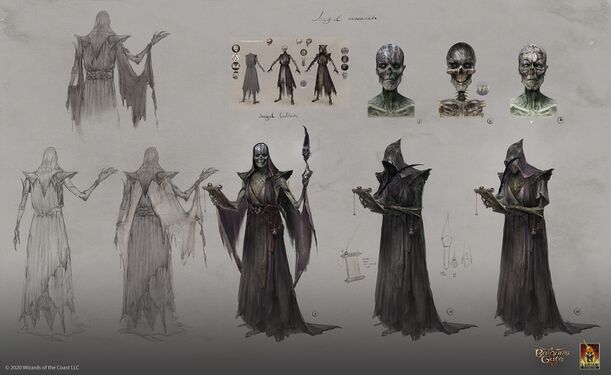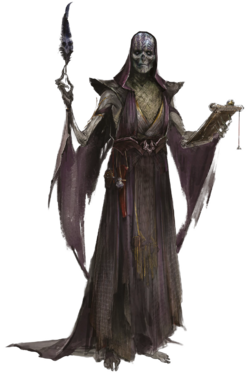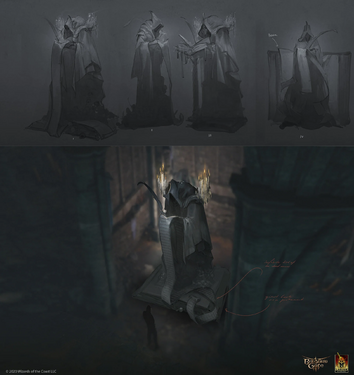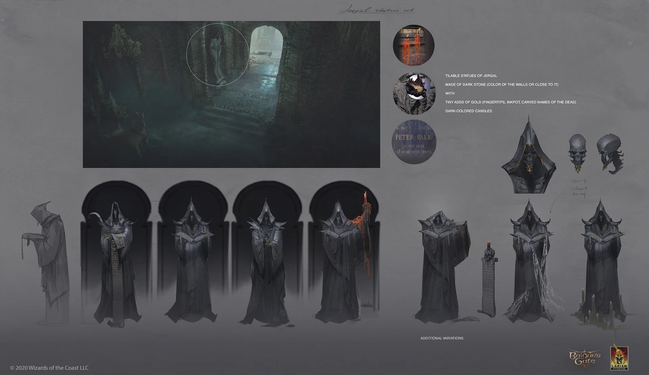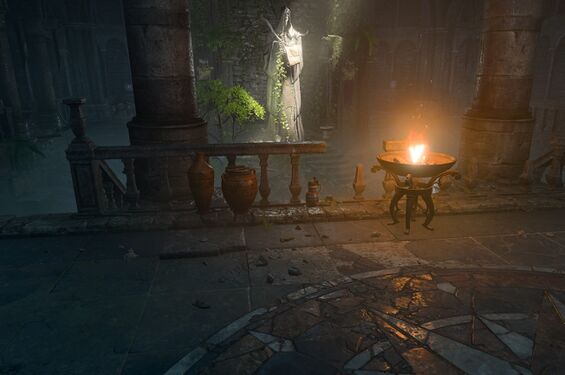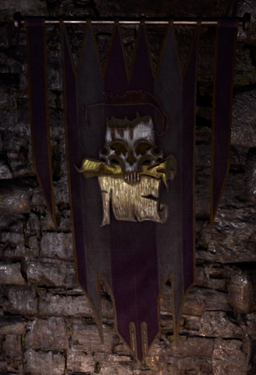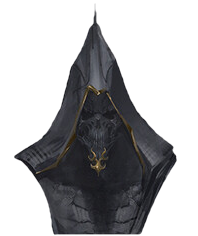Ad placeholder
Jergal: Difference between revisions
Jump to navigation
Jump to search
mNo edit summary |
|||
| Line 1: | Line 1: | ||
{{Infobox creature | {{Infobox creature | ||
| name = Jergal | | name = Jergal | ||
| title = The Final Scribe | | title = The Final Scribe<br>Lord of Bones<br>The Lord of the End of Everything | ||
| image = Jergal_Symbol2.webp | | image = Jergal_Symbol2.webp | ||
| imagecaption = Jergal's symbol | | imagecaption = Jergal's symbol | ||
| race = Deity | | race = [[Deity]] | ||
}} | }} | ||
'''Jergal''', also known as ''The Final Scribe'', ''Lord of Bones'', ''The Lord of the End of Everything'' and many other names, was god of death for aeons until the rise of the [[Dead Three]].<ref>''[[Death & Divinity: A Godly Guide]]''</ref> | '''Jergal''', also known as ''The Final Scribe'', ''Lord of Bones'', ''The Lord of the End of Everything'' and many other names, was god of death for aeons until the rise of the [[Dead Three]].<ref>''[[Death & Divinity: A Godly Guide]]''</ref> | ||
| Line 16: | Line 16: | ||
== Overview == | == Overview == | ||
Jergal is associated with the domains of [[Knowledge Domain|Knowledge]] and Death. Jergal was the ancient god of death, till he gave up his powers and divided them among the [[Dead Three]]. However, he still retains a lot of divine might. | |||
== Related items == | == Related items == | ||
Latest revision as of 15:45, 6 December 2024
Jergal, also known as The Final Scribe, Lord of Bones, The Lord of the End of Everything and many other names, was god of death for aeons until the rise of the Dead Three.[1]

|
“ | Jergal, or so it's often said, |
„ |
| — A is for Azuth, and other Gods VI |
Overview[edit | edit source]
Jergal is associated with the domains of Knowledge and Death. Jergal was the ancient god of death, till he gave up his powers and divided them among the Dead Three. However, he still retains a lot of divine might.
Related items[edit | edit source]
Related literature[edit | edit source]
Related locations[edit | edit source]
Withers[edit | edit source]
While the game never states it outright, it is heavily implied that Withers is either an avatar of Jergal or Jergal himself.
In-game information[edit | edit source]
- He is found at the Shrine of Jergal and a successful Religion check, confirmes that this is a shrine of Jergal and the undead scribes there bear Jergal's insignia.
- The
 Book of Dead Gods can be found nearby, containing a clear reference to the Dead Three.
Book of Dead Gods can be found nearby, containing a clear reference to the Dead Three. - Paladins or Clerics can feel divine energy from Withers. "He has a divine aspect, yes. A reflection of death itself. Eternal and inescapable." If asking him if he's a god's Chosen he will refuse to answer questions in that regard.
- When spoken to by a new companion, Withers will remark "Ah, another. Thy name has been recorded." alluding to his title as "the Final Scribe"
- Likewise when a party member dies and is resurrected by Withers, he will say "I strike thy name from the archives".
- Clerics of Kelemvor have unique dialogue when talking to Withers and sense something familiar about him upon first meeting. He will say unique lines such as "Thou walk with death, child of Kelemvor. That is enough for an understanding between us" and "No, although Kelemvor chose wise to bless one such as yourself" when replying to the player character's questions.
- When talking to Withers in Moonrise Towers, the Party can note that he seems to know a lot about the Dead Three.
- In the Ancient Mausoleum, a
 Crumbling Journal can be found, detailing the encounter of a mortal with Jergal, with a description much alike Withers, and asking the same question that Withers does when the party first meet him: "Masked in gold, his skin fine and worn as parchment. Jergal, the death-keeper, the End of Everything. I asked what he needed of me. He asked a simple question: “What is the worth of a single mortal's life?” "
Crumbling Journal can be found, detailing the encounter of a mortal with Jergal, with a description much alike Withers, and asking the same question that Withers does when the party first meet him: "Masked in gold, his skin fine and worn as parchment. Jergal, the death-keeper, the End of Everything. I asked what he needed of me. He asked a simple question: “What is the worth of a single mortal's life?” " - In Withers' post-epilogue party players can find Milil, a minor deity of song, poetry and inspiration, performing as entertainment. When spoken to, Milil explains that Withers saved him from being trapped in the Fugue Plane by Cyric. He also states that he always performs at Withers' parties and is glad to do so, showing that Withers' powers affect even gods, all but confirming that Withers is Jergal.
- This is further shown if the player attacks another character at the party. Withers approaches and reprimands them for it, opens a portal to the Fugue Plane and easily hurls the player character into it, ending the playthrough. This happens with all player avatars, even ones such as a Mind Flayer or Gale if he became the God of Ambition.
- In the post credits scene, Withers is seen talking to a mural of the Dead Three, expressing disappointment of their actions and telling them that he overestimated them. The way he speaks to the mural is that of someone who is familiar with the Three, which Jergal would be.
- In the ending in which the Dark Urge is imprisoned after killing the Netherbrain, Withers visits the Dark Urge in their cell. Driven mad by Bhaal's influence, the Dark Urge has the option to lash out at Withers and proclaim their desire to strip the skin from his "god-meat". This is further confirmation of Withers' divine nature.
Datamined and other content[edit | edit source]
According to datamined notes, Withers is Jergal. The datamined notes say that he is compelled by Helm to assist the party as penance.
- From the Chapel dialog notes:
| “ | After the party has slain a group of undead scholars, the judge of death--Jergal--climbs out of his sarcophagus to greet them. He has been locked inside for years by the god Helm to atone for his part in raising the Dead Three, wicked gods who are now plotting to conquer the realms. Jergal is emotionless and excessively formal, both resigned to his fate and that of others. He is here to assist the party because that is his divine oath, not out of any true desire to act. Players can attempt to goad or attack him, but to minimal effect, as he is functionally immortal. His only goal was to see their faces, so he can find them at camp later to offer further assistance. |
„ |
- From the Camp dialog notes:
| “ | Jergal, a god of the dead, awaits the player in camp. He is bound by the judgment of another god - Helm - to assist the players as penance for past crimes. He provides resurrection services to the players. |
„ |
- His texture files are named SKEL_HUM_M_<...>_Jergal.
- Three steps in the quest are named ...Jergal:
- ConfrontJergal: "That strange figure found our camp. What does he want?"
- JergalAtCamp: "That strange figure somehow found our camp. He was probably the ruins' greatest secret, but there could still be some treasure down there."
- ConnectedSarcophagusJergal: "The strange figure admitted he was the 'Guardian of Tombs' and that he'd been sealed within one of the ruins' sarcophagi. He was likely the ruins' greatest secret."
- In Withers' official concept art (see gallery below) he is referred to as Jergal.
Quotes[edit | edit source]

|
“ | Jergal? This must be ancient - no one worships the Final Scribe anymore. |
„ |
| — Reacting to a statue in the Dank Crypt |
Gallery[edit | edit source]
Statue of Jergal in the Dank Crypt.
References[edit | edit source]
External links[edit | edit source]
 Jergal on the Forgotten Realms Wiki
Jergal on the Forgotten Realms Wiki

